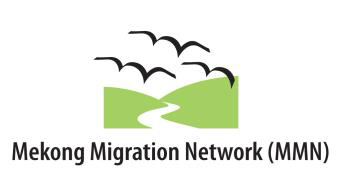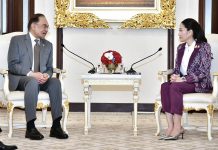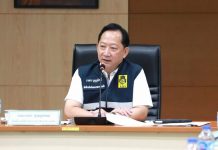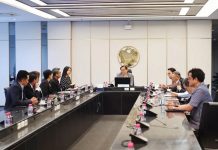 The recent spike in coronavirus (Covid-19) infections recorded in and around Samut Sakhon is alarming to the Mekong Migration Network (MMN) on multiple levels. We are particularly concerned about the potential negative impact of Prime Minister Prayut Chan-o-cha’s remark that this latest flare up is primarily due to “illegal immigrants” who “have brought much grief to the country”. This follows the earlier comment by the Minister of Public Health, Anutin Charnvirakul that “the source is likely migrant workers”.
The recent spike in coronavirus (Covid-19) infections recorded in and around Samut Sakhon is alarming to the Mekong Migration Network (MMN) on multiple levels. We are particularly concerned about the potential negative impact of Prime Minister Prayut Chan-o-cha’s remark that this latest flare up is primarily due to “illegal immigrants” who “have brought much grief to the country”. This follows the earlier comment by the Minister of Public Health, Anutin Charnvirakul that “the source is likely migrant workers”.
Rather than seeking a scapegoat, the current outbreak, centered on Samut Sakhon’s Central Shrimp Market, brings into sharp focus the disproportionate impact that the pandemic is having on the livelihood and health of Thailand’s much maligned migrant workers.
The seafood industry in Samut Sakhon, like elsewhere in Thailand, is hugely dependent on the low paid labour of migrants from Myanmar and Cambodia who live and work in conditions where physical distancing and recommended hygiene measures to prevent the spread of Covid-19 are largely absent. In recent research conducted by MMN member, The Raks Thai Foundation, which included respondents from Samut Sakhon’s seafood industry, migrants reported that very few employers imposed social distancing rules, provided PPE, checked temperatures before work, or used a rota system to limit the number of staff in the workplace at any one time.
The current outbreak is a product of the heightened risks faced by migrants due to their precarious working conditions and marginalisation from wider Thai society. MMN takes the view that Covid-19 preventative measures will only be successful if all of Thailand’s diverse migrant communities are engaged in the response, and are treated fairly without discrimination. It is counterproductive to point the finger at migrants or scapegoat them as the “source” of the outbreak, since the current public health emergency requires collective action that is only possible when no one is left behind. Migrants are also fearful of being locked down or quarantined in cramped, overcrowded conditions.
It should be noted that many of the current difficulties containing the outbreak within the migrant community are rooted in a lack of coherence in policies that impact the lives of migrants. Although many Thai policies in the field of social protection are relatively progressive in their treatment of migrants, implementation is often hamstrung by restrictive immigration policies that treat migrants as temporary workers. This in the face of the reality that a great many migrant workers have lived for years, if not decades, in Thailand and consider it their permanent home.
To tackle the current outbreak in Samut Sakhon, public health must be prioritised, and migrants must be assured that test, trace, and treatment for Covid-19 will be carried out at arms’ length from the immigration authorities. Without a firewall between immigration enforcement and the Covid-19 response, migrants will be fearful of any contact with the authorities. Such an outcome will have serious implications for the Ministry of Public Health’s ability to control the outbreak.
We commend the words of Samut Sakhon Vice Governor Surasak Phonyangsong in remarking that “Myanmar migrant workers are also human beings who deserve to be treated with humanity regardless of their immigration status”.
Recommendations:
In light of the above challenges, MMN calls on the relevant authorities to implement the following recommendations as a matter of urgency:
For the Ministry of Health to publicly announce and put in place measures to ensure that all migrants in Thailand, regardless of their immigration status, can access free public healthcare in relation to the diagnosis and treatment of Covid-19.
For the relevant Thai authorities to publicly announce that a person’s immigration status will not be checked when they approach healthcare service providers for a test or treatment for Covid-19 and that all personal data will be treated in the strictest of confidence with an undertaking that immigration enforcement action will not be pursued against those who come forward.
For the Ministry of Public Health to ensure that all migrants in Thailand are accommodated, free of charge, in appropriate quarantine facilities where such action is deemed necessary.
For the Ministry of Interior, Ministry of Labour, and Ministry of Public Health to urgently work towards a cohesive social protection package that catches all migrants, regardless of their immigration status, before they fall into destitution as a result of the health and economic impact of the pandemic.
For the Ministry of Interior and the Ministry of Labour to pass special measures to facilitate the extension of visas and work permits, and provide amnesty to those who have fallen out of the system.
For the Ministry of Labour to strictly enforce Covid-19 safety measures in all workplaces, and that employers provide their employees with protective equipment such as masks and alco gels for free.
For the Ministry of Labour to ensure that all employees, including migrant workers, receive paid sick leave during any quarantine and/or treatment period.
For the relevant authorities in Thailand and countries of origin to mount a far-reaching coordinated public information campaign aimed at migrants to inform them of important matters relating to the Covid-19 pandemic in appropriate migrant languages. Such information must include: preventative measures to stop the spread of Covid-19; what to do and how to contact the health authorities in the event of falling ill; immigration updates, including information on border closures; how to social distance and self-isolate; quarantine requirements; and relief measures available for migrants in case of sudden loss of income.
For the relevant authorities in Thailand and countries of origin to work together towards a public health and humanitarian response for border crossers, with efforts geared towards encouraging regular migration channels by providing affordable quarantine and health check measures at border entry points.
For the relevant authorities in Thailand and countries of origin to provide accurate information about the pandemic to the general public, and take a clear stance against any stigmatisation and discrimination against migrant communities.
For all the above, MMN urges the governments of countries of origin to actively reach out to their nationals, and closely coordinate with the relevant Thai authorities as well as NGOs to ensure that timely support is provided to all those who are in urgent need.
Moreover, we reiterate our repeated calls for the Association of South East Asian Nations, ASEAN, to work in unity and provide a coordinate response regarding the movement of people in ways that will reduce the potential of virus spreading events while maintaining the dignity and rights of migrants. We emphasize once again the urgent need for portability of social protection in the region.





